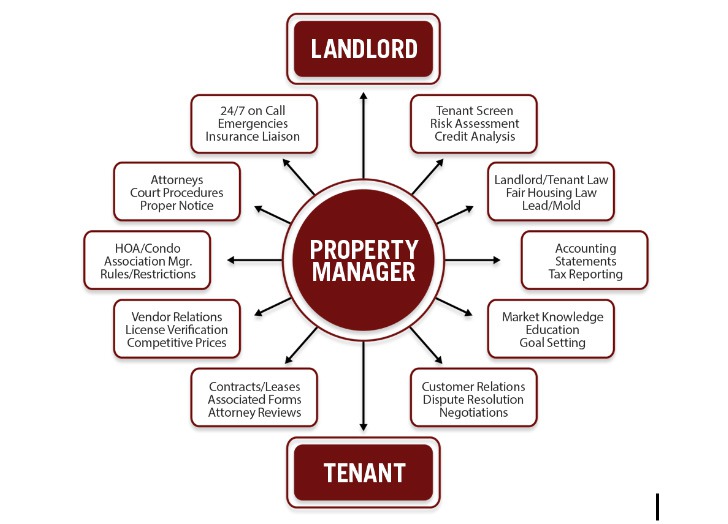Getting My Property Management Services To Work
Getting My Property Management Services To Work
Table of ContentsAll about Property Management Services


An RLA, additionally called a lease agreement or rental agreement, is a lawfully binding agreement in between a tenant and a landlord when renting a residential property. It describes the obligations and legal rights of both parties, consisting of lease amounts, settlement timetables, period of tenancy, maintenance obligations, safety and security down payment terms, and guidelines regulating the residential property. Lease contracts safeguard both property managers and lessees by supplying clearness and lawful option should conflicts emerge. In many jurisdictions, RLAs are required by legislation, and failing to adhere to regional regulations can result in fines or other lawful consequences. An extensive RLA not just makes sure smooth landlord-tenant relationships but also stops misconceptions, late payments, and problems over residential property upkeep or rules.Real estate agents are experts that help with the acquiring, marketing, and leasing of residential properties. Their workplace can be incredibly flexible, permitting them to operate from basically anywhere. Several representatives work remotely from their homes, leveraging modern technology to communicate with customers, routine showings, and manage purchases. Others may operate on-site at their brokerage firm firms, which act as head offices for meetings, paperwork, and customer consultations. Some agents likewise split their time in between visiting buildings, attending client conferences, and carrying out management jobs, which supplies a vibrant and frequently very independent job routine. The adaptability of this occupation makes it attracting people seeking self-reliance and the ability to manage their very own time.While it is definitely possible to acquire or market a residential or commercial property independently, doing so calls for considerable initiative, time, and competence. Property transactions involve lawful, economic, and procedural complexities that might not be obvious to someone unfamiliar with the industry. For instance, agreements should be examined very carefully to prevent unexpected obligations, arrangement skills need to be applied efficiently to attain a desirable rate, and regional laws and regulations should be stuck to in order to avoid penalties or legal conflicts. Due to the fact that they have the knowledge, network, and experience essential to navigate these obstacles, many individuals hire qualified real estate representatives. Agents aid streamline the procedure, minimize risks, and typically achieve far better results for clients by leveraging their market expertise.Commercial realty agents do similar functions to residential agents yet focus solely on industrial residential properties. These include house complexes, office complex, stockrooms, retail rooms, and commercial facilities. Industrial purchases typically include bigger sums of cash and even more complicated contractual setups than property bargains. Because of this, business representatives typically collaborate with investor, local business owner, and company clients who are looking for to purchase, lease, or sell industrial possessions (Property Management Services). The risks in industrial property are higher due to the fact that the properties are more costly, the agreements a lot more thorough, and the potential monetary gains or losses more considerable. This environment requires a high degree of professionalism, analytical capacity, and settlement ability to succeed.While it is feasible to end up being an actual estate agent for the function of managing your own property deals, this technique might not be the most efficient unless you mean to go after a full occupation in real estate. Becoming a licensed representative calls for a financial investment of time, usually including pre-licensing coursework, evaluation prep work, and proceeding education and learning requirements - Property Management Services. In addition, new representatives have to pay costs related to licensing, membership in expert organizations, and possibly the costs of joining a broker agent. For someone just curious about purchasing or selling a solitary building, the in advance prices and learning curve might surpass any type of monetary cost savings gotten from functioning as their own representative. Moreover, specialist agents obtain accessibility to resources and networks, such as the Numerous Listing Service (MLS) and sector get in touches with, which are tough to leverage as an independent buyer or seller.The Function of a Property AgentA licensed property representative is a professional trained to assist customers via the procedure of purchasing, selling, or renting homes. They provide market insights, bargain in behalf of clients, and make certain lawful and monetary compliance throughout the deal. Representatives have accessibility to comprehensive databases and tools that allow them to identify appropriate buildings for customers, or to market homes efficiently for sellers. Their expertise in contract regulation, financing options, and neighborhood market patterns is indispensable in achieving ideal results for their clients.Real estate representatives function as middlemans between purchasers and vendors. They aid customers locate homes that match their budget plans and demands, routine home watchings, and provide unbiased evaluations of market price. For sellers, agents market the residential or commercial property, emphasize secret attributes, organize open homes, and bargain offers to make best use of earnings. In both cases, agents alleviate dangers by making sure important source that contracts and lawful papers are appropriately prepared, preventing prospective conflicts or costly mistakes.Residential vs. Business Actual EstateResidential agents concentrate on properties meant for individual usage, such as single-family homes, condominiums, and apartments. These representatives focus on client fulfillment, residential property problem, area safety and security, and resale worth. Residential agents frequently handle partnerships with individual homeowners and customers, providing customized solution and emotional assistance during what is generally a significant life event.Commercial representatives, on the other hand, operate in a different realm. Commercial residential properties are investment assets, and deals commonly include in-depth financial analysis, market estimates, zoning regulations, and lease arrangements. Industrial representatives function closely with investors, business owners, and companies, typically bargaining multi-million-dollar deals. They must comprehend not just property concepts yet additionally business finance, market characteristics, and threat management.Training and Licensing RequirementsTo become a realty agent, candidates have to meet particular educational and licensing demands, which differ by state or country. Usually, possible agents full pre-licensing courses covering property law, ethics, building evaluation, funding, agreements, and advertising. After finishing coursework, prospects should pass a state licensing test, showing their expertise and preparedness to exercise properly. As soon as certified, representatives may be required to join a broker agent firm and preserve their license through continuing education and learning programs. These programs maintain representatives notified concerning modifications in regulations, market patterns, and best methods, ensuring they offer customers with exact and present advice.Skills Needed to SucceedSuccess in actual estate needs a mix of technical expertise, social abilities, and service acumen. Strong interaction and negotiation abilities are necessary, as agents need to engage with clients, other representatives, attorneys, and loan providers. Analytical skills assist agents examine residential property worths, market patterns, and financial effects of purchases. Business abilities are important for taking care of numerous clients, residential property listings, showings, and paperwork simultaneously.Additionally, resilience and versatility are necessary traits, as property markets vary helpful site and offers may not constantly go as planned. Agents must be prepared to handle being rejected, bargain successfully, and assume tactically to achieve their customers' objectives.Marketing and Technology in Genuine EstateModern realty agents count heavily on innovation and marketing methods to get in touch with clients and close offers. Online building listings, virtual tours, social media advertising and marketing, and e-mail campaigns allow representatives to get to a broader target market successfully. Agents make use of data analytics to determine target markets, price buildings accurately, and forecast market patterns. Customer relationship monitoring (CRM) software program assists agents track customer communications, manage leads, and maintain professional communication. The combination of innovation has transformed the actual estate landscape, making agents a lot more effective and improving the client experience.Financial and Ethical ResponsibilitiesAgents have fiduciary duties to their clients, meaning they need to act in the most effective rate of interest of the client with sincerity, loyalty, and transparency. This consists of disclosing any problems of interest, providing exact market info, and discussing terms that benefit the customer. Agents need to additionally deal with customer funds properly, whether it involves down payment deposits, rent out collection, or escrow accounts. Honest habits is basic to constructing trust, maintaining an expert track record, and making sure long-term success in the industry.Career Opportunities and SpecializationsReal estate offers a large range of profession chances and prospective expertises. Some agents concentrate on luxury properties, while others specialize in industrial actual estate, building administration, or investment residential properties. There are likewise particular niche areas such as holiday leasings, repossessions, or sustainable housing. Field of expertise enables representatives to create experience in a specific segment, attract particular client types, and separate themselves in an affordable market.Challenges in Actual EstateWhile fulfilling, realty careers can be tough. Representatives frequently face irregular revenue, demanding clients, open markets, and rising and fall financial problems. Successful representatives should be self-motivated, positive, and able to manage anxiety effectively. Continual learning, networking, and adaptability are crucial to getting over these obstacles and receiving lasting success.ConclusionBecoming a genuine estate representative includes more than just helping someone buy or offer a home. It requires education, licensing, market knowledge, settlement abilities, and ethical technique. Agents play a vital function in directing clients through intricate purchases, whether property or business. While it is possible to manage your very own residential property purchases without a representative, the expertise, resources, and risk reduction that professional agents offer make them important in accomplishing successful outcomes.Real estate is a vibrant, tough, and gratifying profession that uses adaptability, self-reliance, and the possibility for considerable financial benefits. Whether helping customers with property homes, commercial buildings, or financial investment profiles, representatives act as trusted consultants, negotiators, and market specialists. Their responsibilities include lawful compliance, marketing, customer relationships, financial administration, and calculated decision-making. For those ready to invest commitment, effort, and time, a profession in genuine estate uses opportunities for individual growth, specialist success, and long-term success.
